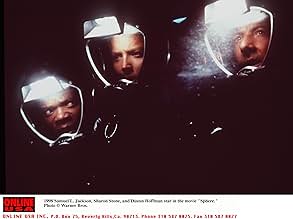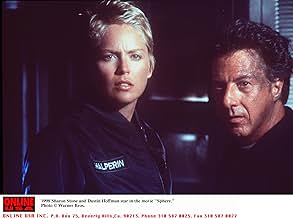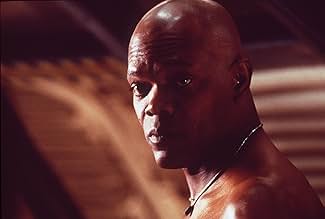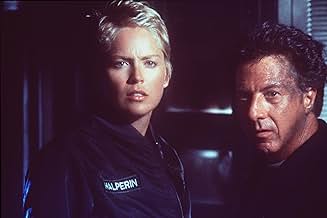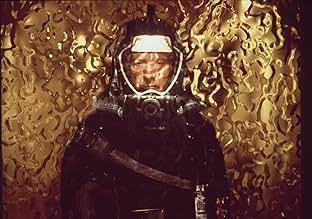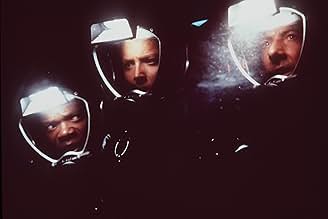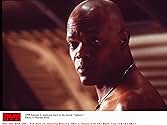Una nave espacial es descubierta bajo un coral de trescientos años en el fondo del océano.Una nave espacial es descubierta bajo un coral de trescientos años en el fondo del océano.Una nave espacial es descubierta bajo un coral de trescientos años en el fondo del océano.
- Premios
- 3 nominaciones en total
Argumento
¿Sabías que...?
- CuriosidadesMany scenes, like Harry (Samuel L. Jackson) and Norman's (Dustin Hoffman's) conversation about making up the ULF report and dealing with Ted (Liev Schreiber), were completely improvised.
- PifiasWhen Jerry first makes contact, he transmits in code : "MY NAME IS JERRY". Later, the code is revealed to have been mistranslated and the message reads: "MY NAME IS HARRY" If the letters H, E, J, and A in the simple letter/number substitution code were wrong, the first message would have read: "MY NEMA IS JERRY". Also, the entire series of conversations they had would have exhibited the same error, yet none did so. (HAPPY would have been JEPPY, ALL = ELL, etc.)
- Citas
Dr. Harry Adams: We're all gonna die down here.
Norman Goodman: What?
Dr. Harry Adams: You see? It's curious. Ted did figure it out - time travel. And when we get back, we gonna tell everyone. How it's possible, how it's done, what the dangers are. But then why fifty years in the future when the spacecraft encounters a black hole does the computer call it an 'unknown entry event'? Why don't they know? If they don't know, that means we never told anyone. And if we never told anyone it means we never made it back. Hence we die down here. Just as a matter of deductive logic.
- Créditos adicionalesThe opening credits are cast over an invisible sphere.
- Versiones alternativasSPOILER ALERT: An alternate television edit has been shown with a simplified and more ambiguous ending that follows the shooting script; Harry warns them that the authorities are on their way to debrief them, and they will demand answers. The three survivors ready themselves to forget about their mission and the power they possess. Outside, a helicopter sets down. Subsequently, we see the three survivors being interviewed in a debriefing room after decompression, each shot individually against the same background. They react as if they're oblivious to anything going wrong in the Habitat, unaware of anything that happened to Ted, Barnes or the Sphere. The helicopter leaves, and the camera pans down to the ocean, where the Sphere supposedly still remains.
- Banda sonoraHorn Concerto No. 3 in E Flat Major, K.447
Written by Wolfgang Amadeus Mozart
Performed by Vienna Mozart Ensemble; Herbert Kraus, Conductor
Courtesy of LaserLight Digital
By arrangement with Source/Q
Barry Levinson is one of those directors who has no interest in art, or in invention, or in pretension, either. And so his films sometimes hit a popular strain that makes them take off. He has some terrible misfires, for sure, but his best films ("Rain Man," "Sleepers") have people who you relate to, and who have to confront something extraordinary.
That was the idea here, based on a Michael Crichton novel (that should have been a heads up). The cast is headliner stuff. Dustin Hoffman is particularly convincing, Samuel Jackson plays a great type, and Liev Schreiber is sharp. Sharon Stone is a dull fourth. They bond, and realize they have things in common, in the first minutes of the film as they converge and go under water to check out an alien spaceship. Even after they are deep below the surface and beginning their unlikely exploration they make a viewer connect. As much as it borrows from "Alien" and "Aliens" this could have been a good film on its own terms. Even the talking computer/alien has its own edge compared to HAL.
What goes wrong is the plot itself, and not acting, or even directing, can overcome that. As it gets hairier, we need it to be more plausible, not less. Events get increasingly chaotic, so that action and loud noise drive some of the scenes. Subplots are continued but seem increasingly meaningless (at one point, Hoffman and Stone are rushing into the water in an absolute emergency and they start to chitchat about their distant failed love affair). And finally, as people die off and the menace becomes more ambiguous, the movie becomes completely ambiguous, and as a kind of escape valve, announces that any number of crazy thing we have been watching may or may not have been imagined by one character or another.
But what does that mean about the camera? Isn't there still a differentiation between cinema reality and one character's delusion? Or if these are global delusions including the viewer, shouldn't they do more than simply disorient us? Well, don't hang on for answers. Just hang on. An explosion (of course) caps it all off (why they didn't hit the disarm button isn't explained), and a final logical wrap up that avoids the time travel paradox is warm and fuzzy.
- secondtake
- 9 oct 2010
- Enlace permanente
Selecciones populares
- How long is Sphere?Con tecnología de Alexa
Detalles
Taquilla
- Presupuesto
- 80.000.000 US$ (estimación)
- Recaudación en Estados Unidos y Canadá
- 37.020.277 US$
- Fin de semana de estreno en EE. UU. y Canadá
- 14.433.957 US$
- 15 feb 1998
- Recaudación en todo el mundo
- 37.020.277 US$
- Duración2 horas 14 minutos
- Color
- Mezcla de sonido
- Relación de aspecto
- 2.39 : 1
Contribuir a esta página



